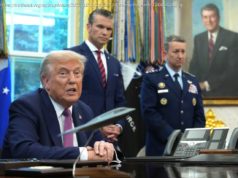It was an uphill battle that Technical Sergeant John A. Chapman fought on March 2,2002, on a 10,000-foot-high mountain in Afghanistan. His helicopter had been shot down, but he managed to recover from the crash and battled enemy fire to rescue a teammate who had been knocked out of the aircraft on the top…
It was an uphill battle that Technical Sergeant John A. Chapman fought on March 2,2002, on a 10,000-foot-high mountain in Afghanistan. His helicopter had been shot down, but he managed to recover from the crash and battled enemy fire to rescue a teammate who had been knocked out of the aircraft on the top of the mountain.
On Aug. 22, Chapman was posthumously awarded the Congressional Medal of Honor for his valor and sacrifice for his country and his fellow servicemen.
“In his high school yearbook, John quoted these words: ‘Give of yourself before taking of someone else.’… Everybody that knew him said that’s the way he lived,” President Trump said in an award ceremony at the White House. “Today is the day to share his incredible story with the world.”
Two years after he graduated Windsor Locks High School in Windsor Locks, Connecticut, in 1983, Chapman enlisted in the Air Force and went through the rigorous Air Force Special Tactics training. After 9/11, he volunteered to go to Afghanistan to fight for his country.
“John became an expert in deploying undetected onto the battlefield to set up airfields and direct fire support,” Trump said.
But on that fateful day in 2002, he was detected by the enemy as he and his team mates were trying to exit onto Takur Gahr mountain in southeast Afghanistan. A grenade and machine gun fire hit the helicopter, and as it lurched away, Petty Officer First Class Neil Roberts fell out.
The helicopter crashed below but fortunately no one was killed. They were rescued by a second helicopter, but instead of returning to safety, they decided to try to retrieve Roberts, who they believed was still alive.
Chapman and his team mates went back up the mountain, wading through deep snow and against enemy fire to get to what they knew was an enemy stronghold.
Despite the odds, Chapman was able to get to an enemy bunker and kill its occupants. While attempting to take a second bunker, Chapman was severely wounded. He lost consciousness but later came to and continued to fight, giving cover fire to an American helicopter that was approaching. His valor is credited with saving 20 of his fellow servicemembers.
“Our nation is rich with blessings, but our greatest blessings of all are the patriots like John and all of you… who, like John, carry our freedom on their shoulders,” Trump said.
Chapman wasn’t the only one who lost his life that day. Six other servicemembers also perished in the fight.
He left behind his wife Valerie Nessel and two daughters Madison and Brianna, who accepted the medal on his behalf.
Five other Medal of Honor awardees also attended the ceremony.
The Congressional Medal of Honor was introduced to Congress in 1861, and since then, over 3,500 medals have been awarded to members of the Army, Navy, Air Force, Marine Corps, and Coast Guard.
The award is the highest honor for valor in action against an enemy force, and for someone to earn it, there must be proof beyond a reasonable doubt that the act the meritorious act took place.
Chapman is the first Special Tactics Airman to receive the Congressional Medal of Honor.





